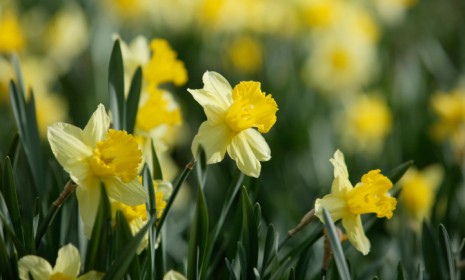Could daffodils hold a cure for depression?
Scientists from the University of Copenhagen identify a chemical compound embedded in the flower that tricks the hard-to-treat brain into receiving drugs

A free daily email with the biggest news stories of the day – and the best features from TheWeek.com
You are now subscribed
Your newsletter sign-up was successful
For some people, the bright yellow color of daffodils can signify springtime cheer, and new research suggests the flower might actually be beneficial to those suffering from mental illness. University of Copenhagen researchers say that a chemical compound in daffodils may be the key to treating stubborn brain conditions like depression and anxiety. Here, a concise guide to the findings:
Why is depression so hard to treat?
The brain is wrapped in a blood barrier that forms a protective cover. Unfortunately, this barrier is bad news for drugs intended to treat diseases: Nine out of 10 chemical compounds are booted out by the barrier's guard proteins as soon as they make it in.
The Week
Escape your echo chamber. Get the facts behind the news, plus analysis from multiple perspectives.

Sign up for The Week's Free Newsletters
From our morning news briefing to a weekly Good News Newsletter, get the best of The Week delivered directly to your inbox.
From our morning news briefing to a weekly Good News Newsletter, get the best of The Week delivered directly to your inbox.
So how can daffodils help?
Scientists at the University of Copenhagen discovered that a breed of South African daffodils contain a compound that essentially "tricks" the barrier into letting drugs through. Researchers surmise that this can be used to essentially camouflage different medicines like antidepressants. "The blood vessels of the brain are impenetrable for most compounds, one reason being the very active transporter proteins," lead researcher Birger Brodin tells the Daily Mail. "So it is of great interest to find compounds that manage to 'trick' this line of defense."
Why is this an advantage?
Psychiatric treatment drugs are harsh on the body and often come with "horrible side effects," says Harold Mandel at Examiner, and that's why scientists are always looking for natural ways — including possibly using flowers — to treat mental illnesses. Still, these new findings mark "the first stage of a lengthy process," says Brodin, "so it will take some time before we can determine which of the plant compounds can be used to further drug development."
A free daily email with the biggest news stories of the day – and the best features from TheWeek.com
Sources: Daily Mail, Examiner, International Business Times, PsychCentral
-
 Sepsis ‘breakthrough’: the world’s first targeted treatment?
Sepsis ‘breakthrough’: the world’s first targeted treatment?The Explainer New drug could reverse effects of sepsis, rather than trying to treat infection with antibiotics
-
 James Van Der Beek obituary: fresh-faced Dawson’s Creek star
James Van Der Beek obituary: fresh-faced Dawson’s Creek starIn The Spotlight Van Der Beek fronted one of the most successful teen dramas of the 90s – but his Dawson fame proved a double-edged sword
-
 Is Andrew’s arrest the end for the monarchy?
Is Andrew’s arrest the end for the monarchy?Today's Big Question The King has distanced the Royal Family from his disgraced brother but a ‘fit of revolutionary disgust’ could still wipe them out